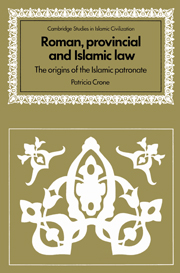5 - The case against the non-Roman Near East: paramonē
Published online by Cambridge University Press: 16 October 2009
Summary
If the personal clientage of Islamic law did not come from Arabia, where could it have come from? A tie of this kind, i.e. one which arose automatically on manumission, attached the freedman to the manumitter's kin and granted the latter a title to the freedman's estate, was unknown to Akkadian law, ancient Egypt, Jewish law, and, in so far as one can tell, also Sasanid Iran; and though it was probably once a feature of Greek law, this had long ceased to be the case. If the Islamic patronate did not come from Arabia, the only alternative source is Rome.
It is the purpose of this chapter to restate this point in more positive terms. The argument which I shall present is in essence the following. Throughout the Near East, both Roman and non-Roman, relations between manumitter and freedman were shaped overwhelmingly by the so-called paramonē. This institution also plays a major role in Islamic law where, as we shall see, it has been accepted in the modified form of kitāba, and its continuance demonstrates that Arab manumitters did indeed pay attention to the legal practices of their non-Arab subjects. It is undeniable and significant that the influence of the provincial institution on Islamic law is considerably easier to demonstrate than that of its Roman counterpart. But the absence of a patronate of the Roman or Islamic type from pre-Islamic Arabia on the one hand, and the prominence of paramonē throughout the Near East on the other, suggest that if the Arab conquests had not included Roman provinces, there would not have been an Islamic patronate of the type we know.
- Type
- Chapter
- Information
- Roman, Provincial and Islamic LawThe Origins of the Islamic Patronate, pp. 64 - 76Publisher: Cambridge University PressPrint publication year: 1987
- 1
- Cited by



